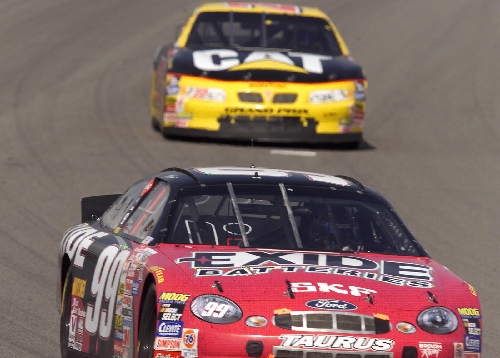Vegas stop helped bolster NASCAR betting
When Las Vegas sports books starting popping up in casinos in the late 1980s, the wagering menu offered to the public was already set thanks to a heavy dose of generational conditioning.
Many people had grown up knowing the nuances of baseball, football and basketball, so it was easy for folks to understand how to bet on them, either in sports books or with the corner bookie in their old hometowns.
Sports books just can't create their own events; they have to be live, credible events with a following to justify offering the odds, not to mention the time it takes to study the tendencies of the participants involved. Before the 1990s, booking sports was a meat-and-potatoes game with just the core team sports.
Then something strange happened. In 1994, people coming into Las Vegas books began asking for the weekly NASCAR races. Most of the books offered only the Daytona 500 and the open-wheel Indianapolis 500 as auto racing options.
Some books laughed at the notion of offering weekly odds on the races, usually with a punch line involving a fan stereotype -- something comedian Jeff Foxworthy might deliver. Other books embraced the idea and tried to get as much information as possible on the weekly NASCAR races to offer a fair line.
And why not?
If people have money and want to ask the casino to hold it until the outcome is decided on something, well, isn't that what Las Vegas is all about?
The combination of increased television coverage and intense rivalries shaping up in the series caught on with fans all across the country. The young California kid in Jeff Gordon taking on the brash Dale Earnhardt, and beating him, piqued interest everywhere.
It no longer was a Southern thing, and the few books in Vegas offering the weekly odds were getting attention at the betting windows.
The evolution of betting on NASCAR took off on its own course in 1998, when Bill Bennett and Ralph Englestadt brought the first NASCAR Cup series race to Las Vegas at their new track.
The first year was somewhat overwhelming for the books, because all these people had lots of money and were looking for any type of action on the race. The only thing there was to bet were odds to win and a couple driver matchups.
In 1999, prop bets really took off, beginning with the Daytona 500. After reviewing the volume from each race in the 1998 season, it was determined that the two biggest races of the year were Vegas and Daytona, and they deserved a little more attention. That's when the propositions and driver matchups went up in a manner similar to the Super Bowl.
Anything that NASCAR posted as an official statistic went into some kind of prop. Lap leaders, number of drivers to lead a lap, cautions, winning car number and winning manufacturer were just a few options offered to the betting public, in addition to the odds-to-win index that featured about 30 drivers.
At first, many of the fans didn't get the props. They understood getting 5-1 on Jeff Gordon to win the race, but laying odds in a two-way proposition seemed confusing. First-time bettors in a sports book, for any sport, often feel intimidated because they don't want to ask questions for fear of looking stupid.
It took a few years to get the fans coming into town for the race -- as well as many locals -- to get the hang of NASCAR wagering, but by 2001, it had taken off. Fans were more educated and smarter than ever on how to approach the odds and props in an effort to beat the casino.
The sports books, at the same time, had to stay on top of their game. They began devoting time and manpower on Fridays and Saturdays to what happened in qualifying and practices. The drivers with the better times in practice had their odds to win dropped a notch, while the slower drivers got bumped up in price.
Then, with off-shore sports books popping up all over the world via the Internet, the popularity of NASCAR betting climbed even higher.
The overall handle on the events doesn't compare to team sports, simply because there is only one race per week. But it's not unusual for a Sprint Cup race to be the most wagered-upon event of any given week.
This week's Shelby American race will be the second-largest wagering event of the month in Las Vegas, behind the betting behemoth of the Super Bowl. Not bad for something that came out of nowhere 20 years ago and fell, gift-wrapped, into the hands of sports books.
Micah Roberts, a former race and sports director, has been setting NASCAR lines in Las Vegas since 1995. He writes for various outlets covering all sports. He can be reached at MM.Roberts7@gmail.com.

















